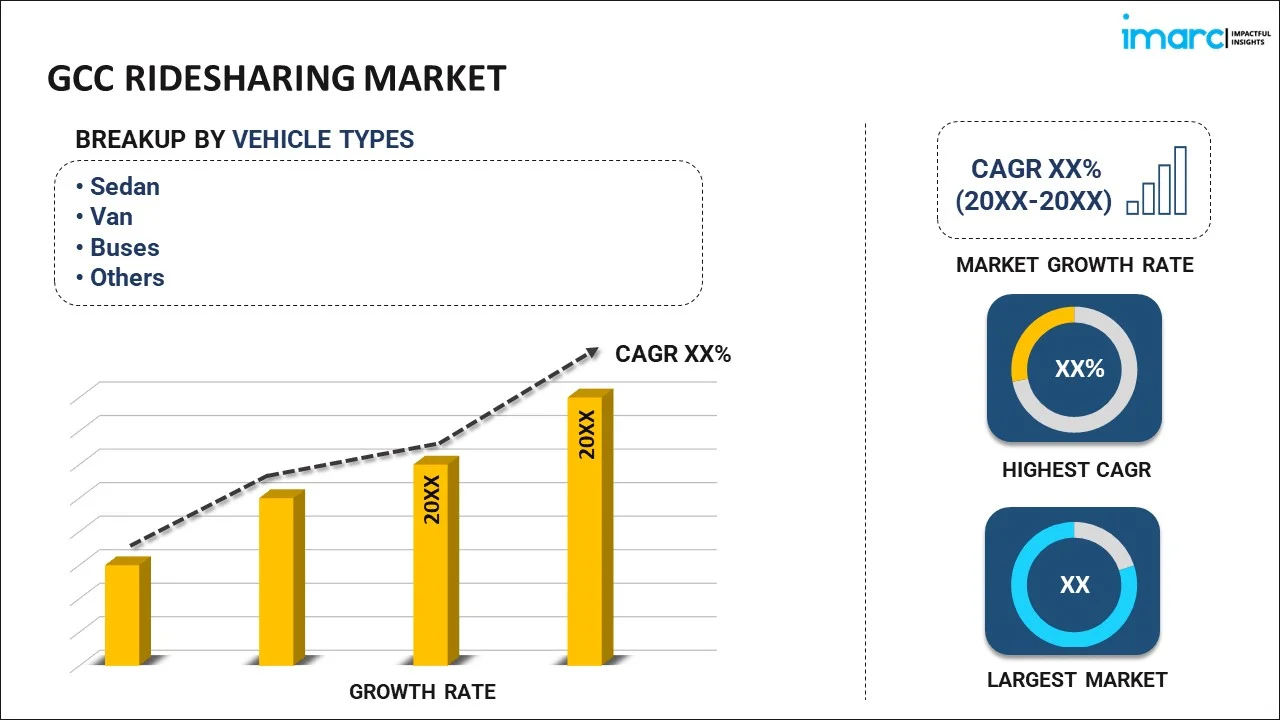
GCC Ridesharing Market Report by Vehicle Type (Sedan, Van, Buses, Utility Vehicle, Coaches), Booking Type (Online, Offline), Commute Type (Intracity, Intercity), Service Type (Web Based, App Based, Web and App Based), and Country 2025-2033
Market Overview:
The GCC ridesharing market size reached USD 3.2 Billion in 2024. Looking forward, IMARC Group expects the market to reach USD 12 Billion by 2033, exhibiting a growth rate (CAGR) of 16.2% during 2025-2033. The rapid urbanization and increased traffic congestion, increasing youthful population, growing tourism and business travel, rising environmental concerns, and diverse mobility options represent some of the key factors driving the market.
|
Report Attribute
|
Key Statistics
|
|---|---|
|
Base Year
|
2024 |
|
Forecast Years
|
2025-2033
|
|
Historical Years
|
2019-2024
|
| Market Size in 2024 | USD 3.2 Billion |
| Market Forecast in 2033 | USD 12 Billion |
| Market Growth Rate (2025-2033) | 16.2% |
Ridesharing, also known as carpooling or car-sharing, is a modern transportation phenomenon that involves the sharing of private vehicles among individuals traveling in the same direction. This practice optimizes resource utilization by reducing the number of single-occupancy vehicles on the road, thereby alleviating traffic congestion and environmental impacts. Ridesharing typically takes place through dedicated ridesharing platforms or apps, where individuals can connect with drivers who are willing to offer rides and share the costs. The concept of ride sharing has gained substantial traction in recent years due to its potential to enhance commuting efficiency, decrease transportation expenses, and contribute to a greener environment. By bringing together passengers with compatible routes, ridesharing minimizes the overall carbon footprint, as fewer vehicles are needed to transport the same number of people. This reduction in emissions aligns with broader sustainability goals and governmental efforts to curb air pollution and fossil fuel consumption.
GCC Ridesharing Market Trends:
The rapid urbanization observed in GCC cities has led to increased traffic congestion and longer commuting times. Ridesharing services offer a practical solution for residents seeking more efficient and convenient ways to navigate the urban sprawl. Additionally, the GCC region has a substantial young population that is tech-savvy and open to embracing digital solutions. This demographic trend has fueled the adoption of ridesharing apps, making it a preferred mode of transportation for a tech-oriented generation. Other than this, the GCC nations are prime destinations for both business and leisure travelers. Ridesharing offers an accessible and reliable means of transportation for visitors, contributing to the steady demand for such services. Besides this, in various GCC countries, cultural norms discourage the use of public transportation, especially for women. Ridesharing offers a more comfortable and secure alternative, aligning with cultural preferences. In line with this, ridesharing presents cost-effective alternatives to owning and maintaining a personal vehicle. This appeal resonates in the GCC, where cost-conscious consumers seek ways to manage their expenses. Furthermore, as global environmental awareness grows, an increasing number of individuals in the GCC region are seeking greener transportation options. Ridesharing contributes to reduced emissions by promoting shared rides and decreasing the overall number of vehicles on the road. Moreover, ridesharing platforms have expanded their services beyond traditional car rides to include options like shared bicycles and scooters. This diversification aligns with the changing preferences of users who seek flexibility in their transportation choices.
GCC Ridesharing Market Segmentation:
IMARC Group provides an analysis of the key trends in each segment of the GCC ridesharing market report, along with forecasts at the regional and country levels for 2025-2033. Our report has categorized the market based on vehicle type, booking type, commute type, and service type.
Vehicle Type Insights:

- Sedan
- Van
- Buses
- Utility vehicle
- Coaches
The report has provided a detailed breakup and analysis of the market based on the vehicle type. This includes Sedan, van, buses, utility vehicle, and coaches.
Booking Type Insights:
- Online
- Offline
A detailed breakup and analysis of the market based on the booking type has also been provided in the report. This includes online and offline.
Commute Type Insights:
- Intracity
- Intercity
The report has provided a detailed breakup and analysis of the market based on the commute type. This includes intracity and intercity.
Service Type Insights:
- Web Based
- App Based
- Web and App Based
A detailed breakup and analysis of the market based on the service type has also been provided in the report. This includes web based, app based, and web and app based.
Country Insights:

- Saudi Arabia
- UAE
- Qatar
- Oman
- Kuwait
- Bahrain
The report has also provided a comprehensive analysis of all the major regional markets, which include Saudi Arabia, the UAE, Qatar, Oman, Kuwait, and Bahrain.
Competitive Landscape:
The report has also provided a comprehensive analysis of the competitive landscape in the market. Competitive analysis such as market structure, key player positioning, top winning strategies, competitive dashboard, and company evaluation quadrant has been covered in the report. Also, detailed profiles of all major companies have been provided.
GCC Ridesharing Market Report Coverage:
| Report Features | Details |
|---|---|
| Base Year of the Analysis | 2024 |
| Historical Period | 2019-2024 |
| Forecast Period | 2025-2033 |
| Units | Billion USD |
| Scope of the Report | Exploration of Historical and Forecast Trends, Industry Catalysts and Challenges, Segment-Wise Historical and Predictive Market Assessment:
|
| Vehicle Types Covered | Sedan, Van, Buses, Utility Vehicle, Coaches |
| Booking Types Covered | Online, Offline |
| Commute Types Covered | Intracity, Intercity |
| Service Types Covered | Web Based, App Based, Web and App Based |
| Countries Covered | Saudi Arabia, UAE, Qatar, Oman, Kuwait, Bahrain |
| Customization Scope | 10% Free Customization |
| Post-Sale Analyst Support | 10-12 Weeks |
| Delivery Format | PDF and Excel through Email (We can also provide the editable version of the report in PPT/Word format on special request) |
Key Questions Answered in This Report:
- How has the GCC ridesharing market performed so far and how will it perform in the coming years?
- What has been the impact of COVID-19 on the GCC ridesharing market?
- What is the breakup of the GCC ridesharing market on the basis of vehicle type?
- What is the breakup of the GCC ridesharing market on the basis of booking type?
- What is the breakup of the GCC ridesharing market on the basis of commute type?
- What is the breakup of the GCC ridesharing market on the basis of service type?
- What are the various stages in the value chain of the GCC ridesharing market?
- What are the key driving factors and challenges in the GCC ridesharing market?
- What is the structure of the GCC ridesharing market and who are the key players?
- What is the degree of competition in the GCC ridesharing market?
Key Benefits for Stakeholders:
- IMARC’s report offers a comprehensive quantitative analysis of various market segments, historical and current market trends, market forecasts, and dynamics of the GCC ridesharing market from 2019-2033.
- The research study provides the latest information on the market drivers, challenges, and opportunities in the GCC ridesharing market.
- Porter's five forces analysis assist stakeholders in assessing the impact of new entrants, competitive rivalry, supplier power, buyer power, and the threat of substitution. It helps stakeholders to analyze the level of competition within the GCC ridesharing industry and its attractiveness.
- Competitive landscape allows stakeholders to understand their competitive environment and provides an insight into the current positions of key players in the market.
Need more help?
- Speak to our experienced analysts for insights on the current market scenarios.
- Include additional segments and countries to customize the report as per your requirement.
- Gain an unparalleled competitive advantage in your domain by understanding how to utilize the report and positively impacting your operations and revenue.
- For further assistance, please connect with our analysts.
 Request Customization
Request Customization
 Speak to an Analyst
Speak to an Analyst
 Request Brochure
Request Brochure
 Inquire Before Buying
Inquire Before Buying




.webp)




.webp)












